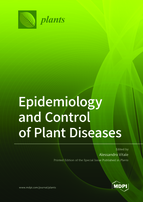Epidemiology and Control of Plant Diseases
A special issue of Plants (ISSN 2223-7747). This special issue belongs to the section "Plant Protection and Biotic Interactions".
Deadline for manuscript submissions: closed (31 May 2022) | Viewed by 40861
Special Issue Editor
Interests: plant diseases; phytopathogenic fungi; plant protection; biological control agents
Special Issues, Collections and Topics in MDPI journals
Special Issue Information
Dear Colleagues,
Currently, global climatic changes (GCC) caused by human activities, above all including the consumption rates of fossil fuel and deforestation, have progressively caused an increase of CO2 (carbon dioxide) concentrations in atmosphere and, simultaneously, a significant global mean temperature. All this has had and is having direct repercussions on the amount of food resources and their supply. Among these GCC effects, the life cycle and epidemiology of plant pathogens are and will be deeply altered within the same crop season. As a consequence to these phytopathological implications and challenging scenarios, plant protection and disease management should be deeply reconsidered above all for timing of treatments. To this regard, it is noteworthy that some plant disease epidemics have currently shocking effects on food and forestry heritage losses in the world. A better knowledge of pathogen epidemiology as well as of correct technical placement of control measures could better satisfy the growing interest in strategies aiming at a rational and sustainable approach for plant disease management. In the light of above considerations, researchers and technicians are invited to investigate epidemiological (biological) cycles of airborne and soilborne plant pathogens with the aim to ensure a good agricultural productivity, maintaining an effective management of plant diseases and, simultaneously, a good economic and environmental sustainability. This Special Issue will underline the performances of new eco-sustainable control means to increase our knowledge for plant pathologists, international scientific communities, and industries and will provide a better understanding of the mode of action and timing application procedure of control means in different soil–plant systems. At the same time, an early and deep understanding of plant disease epidemiology is needed to better anticipate challenges ahead and to relate directly with disease control strategies.
Dr. Alessandro Vitale
Guest Editor
Manuscript Submission Information
Manuscripts should be submitted online at www.mdpi.com by registering and logging in to this website. Once you are registered, click here to go to the submission form. Manuscripts can be submitted until the deadline. All submissions that pass pre-check are peer-reviewed. Accepted papers will be published continuously in the journal (as soon as accepted) and will be listed together on the special issue website. Research articles, review articles as well as short communications are invited. For planned papers, a title and short abstract (about 100 words) can be sent to the Editorial Office for announcement on this website.
Submitted manuscripts should not have been published previously, nor be under consideration for publication elsewhere (except conference proceedings papers). All manuscripts are thoroughly refereed through a single-blind peer-review process. A guide for authors and other relevant information for submission of manuscripts is available on the Instructions for Authors page. Plants is an international peer-reviewed open access semimonthly journal published by MDPI.
Please visit the Instructions for Authors page before submitting a manuscript. The Article Processing Charge (APC) for publication in this open access journal is 2700 CHF (Swiss Francs). Submitted papers should be well formatted and use good English. Authors may use MDPI's English editing service prior to publication or during author revisions.
Keywords
- global climatic changes
- plant pathogens
- airborne agents
- soilborne agents
- sustainable approach
- biological control agents
- epidemiology
- life cycle
- plant disease management







